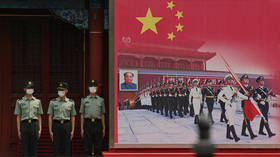The West has no right to preach to Muslim countries about human rights in China
is a British writer and analyst of politics and international relations with a primary focus on East Asia.
Over the weekend, Axios journalist Jonathan Swan interviewed Pakistan’s Prime Minister Imran Khan on HBO. The outlet is well-known for pitching anti-China narratives, and Swan pressed Khan for his thoughts on what is happening to the Uighurs in Xinjiang, specifically calling their treatment a “genocide”. Khan rejected the questions, stating that Pakistan and China had a longstanding friendship and that Beijing had supported Islamabad through the “toughest of times”.
Unsurprisingly, Axios followed up by reporting that Khan was dismissive of the situation and even accused him of being silenced by a ‘debt trap’ owing to his country’s reliance on China for the China-Pakistan Economic Corridor (CPEC), stating: “Khan is silent for a simple reason: cash-strapped Pakistan has become increasingly financially dependent on China, for billions in loans and investment.” Inevitably, the rest of the mainstream media also pushed this narrative, with the BBC quoting critical Pakistani diaspora voices in both the UK and Washington.
But is Khan’s position solely motivated by money? Absolutely not. Those living in Islamic countries believe the US and Western media have no credibility preaching to them about alleged human rights abuses regarding Muslims, and no Pakistani leader would be gullible enough to take such rhetoric at face value.
After all, public approval of the United States in Pakistan is among the lowest in the world, and a survey in the Obama era demonstrated the extent of this, with just 17% having a favourable view of America. Ultimately there is no other set of nations than the US and its allies which have engaged in such serious crimes against Muslims.
While the US preaches the mantra of ‘human rights’ and its media suggests that China is the enemy of Muslims, Islamic countries are conscious that this very same rhetoric has been used to pursue the wholesale destruction of Muslim lands across a massive scope of time.
From whitewashing Israel’s bombing of Gaza just a month ago, to events in Afghanistan, Iraq, Syria, Libya, Somalia and more, why should Imran Khan take this kind of questioning seriously? Comparatively, it’s ridiculous to suggest China is the problem for the Muslim world when history speaks for itself.
This alone is a key point as to why the China-Pakistan relationship, despite significant ideological and theological differences, is so successful. It isn’t about money. Pakistan may be an Islamic republic and China a secular communist state which has advocated materialism and atheism. But the two countries have a rich 70-year history of ties which has been described as an “iron brotherhood”, built on common values of post-colonial and ‘global south’ solidarity, as well as the common norms of respect for territorial integrity and national sovereignty.
This has ensured a strong partnership, which has been further cemented by a common scepticism of India. To try to diminish this entire legacy on the idea ‘China has bought Pakistan’s silence’ is insulting and ignorant.
And that’s why when the US and its media suddenly accuse China of committing genocide in Xinjiang and suggest that Muslims have a responsibility to speak out about it, the idea is simply not credible to many in Islamic countries. They’ve heard it all before, often at their own expense.
Indeed, there are many other Muslim countries that share Pakistan’s views on Xinjiang and have even voiced support for China, including Iran, Egypt and Saudi Arabia.
The Western narrative is that they are ‘bought’, but this dismisses the logical consideration that even if their ideologies differ drastically, to actively promote what amounts to Islamism, extremism and separatism in other countries creates domestic instability, unrest and similar problems in tandem. They are not endorsing an all-encompassing security state, as Xinjiang is often described as; they’re supporting the right to control their own national affairs and maintain stability.
Take, for example, Turkey. While President Recep Tayyip Erdogan’s own Pan-Turkish nationalism means he cannot support the Uighur situation in China, he does not weaponize the idea so readily, precisely because of one consideration: the Kurds. Similarly, in Pakistan itself, the government is constantly fighting an insurgency demanding independence for Balochistan.
Indonesia, too, may not openly support China’s Xinjiang position, but remains diplomatically silent on it precisely because of the enormous can of worms it would open with some of its ethno-separatist movements.
ALSO ON RT.COMIs the real reason the US is so interested in what’s going on in Xinjiang because it contains so much oil?So the West is being disingenuous in its attitude towards the treatment of Muslims, as it does not truly consider the national interests of these countries too. This is why China has been able to get scores of countries to support it at the UN on this matter, not because it ‘bought them off’. It’s common interest.
As a whole, the Axios interview with Khan illustrates the sheer lack of awareness, double standards and lack of empathy for the Muslim world among Western journalists, and by extension their lack of empathy or remorse for the West’s own crimes against Islam as a whole.
They are blinkered so deeply by the ‘saviourship’ of human rights and the strident belief they are in the right that they completely fail to comprehend why other countries do not take their rhetoric seriously.
The same countries who destroyed the Middle East and give blanket backing to Israel have now appointed themselves as the champions of Uighurs, and are crying foul when Pakistan refuses to criticise its partner of 70 years. We shouldn’t be surprised.
The statements, views and opinions expressed in this column are solely those of the author and do not necessarily represent those of RT.


0 Comments:
Post a Comment
Subscribe to Post Comments [Atom]
<< Home